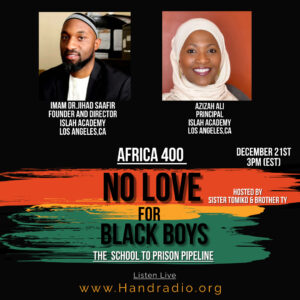
The Wednesday, December 21, 2022 edition of Africa400 profiles the Islah Academy of Los Angeles, California. Show hosts Sis. Tomiko and Bro. Ty welcome Imam Dr. Jihad Saafir, the Academy’s Founder and Director, and Mama Azizah Ali, the Academy’s Principal.
Africa400 airs every Wednesday at 3:00 PM (Eastern Time, United States) on HandRadio, https://handradio.org. Be sure to tune in for the show. After the show airs, it can be listened to again in an updated version of this post and on our Media Page.
“Race is a prominent construct here in America, we cannot separate ourselves from our race. And so we go in there with a religio-racial identity,” says Saafir, executive director of the nonprofit Islah LA.
Islah LA is an inner-city community center founded by Black Muslims to serve the South Los Angeles area. Founded in 2013, it does so through a food pantry, family counseling, four homes dedicated to providing transitional housing for people experiencing homelessness, and safe-place programming for families. Under that umbrella is Islah Academy, a pre-kindergarten through 8th-grade school that seeks to operate outside of the school-to-prison pipeline.
Zero-tolerance policies in U.S. schools, where students were expelled or suspended and referred to law enforcement, gained traction in the 1980s and 1990s because of harsh legislation such as California’s Three Strikes law, which imposed a life sentence for even minor crimes for repeat offenders. Punitive policies continued in spite of studies showing that a student who is suspended is less likely to finish school and is more likely to be in prison by their 20s. Data shows that such policies disproportionately affected Black and Brown students.
While California has sought to reverse these policies in recent years, the effects are still felt. Black individuals account for 6%of California’s population – but 28% of the state’s prison population.
In 2012, when Islah was just an idea, Saafir says the community was “plagued by the absence of our young people” when they reached high school. Many, he says, would become embroiled in the culture of gang activity or end up in prison.
Founded on the principles of restorative justice in 2013, Saafir says Islah Academy is a safe haven from the ills that often exist in the inner city and the damage wrought by the school-to-prison pipeline.
“There were a number of educators in our community who were like, ‘There has to be an alternative to public school,’” recalls Azizah Ali, principal and one of the founding members of Islah Academy. A former public school teacher herself, she says there were three main issues the founders hoped to combat at Islah: students’ safety, kids feeling seen and represented, and youth holding on to their faith.
“We wanted something that was really restorative, and not punitive,” Ali says.
Garland Bush, the director of student affairs as well as a founding member, says that’s not just a theoretical commitment: students and teachers live out these principles in the classroom and school grounds. If there was an incident on the playground, for example, instead of slapping the student with a suspension and keeping that child from receiving an education, Islah’s entire school community comes together in a restorative justice circle.
“We allow the students to talk about their feelings of the situation and talk about how and where it stemmed from, taking into consideration what that child is going through in their home life, the trauma they have,” she says. “And really asking the community, what do you need from this student to make the community whole again.”
The name Islah, in Arabic, means to revive, renew and restore. Students debate what harm was done to the school community and community at large, how they can repair the relationship and what accountability requires. The students themselves create the consequences.
“We had one student who was using really foul language towards the young ladies … and the school community said, you should get up after jummah [prayer services] and do a speech about respecting women,” Ali recalls. At first the student was embarrassed and resisted, before eventually holding himself accountable and doing it. He received a standing ovation after his speech.
“He got so much support,” Ali says.
Instead of punishing the student, Bush finds this model offers a “platform for deeper learning, it gives a platform for better communication.”
These restorative justice circles are not just used for disciplinary reasons or to address behavioral issues, they also serve as a platform to have deeper discussions about what happens in society. When rapper Nipsey Hussle was murdered down the street from Islah in 2019, the school came together to discuss what had happened.
“There was a student, a sweet little boy, who brought a knife. He was like, ‘to protect myself.’ They didn’t feel safe after that happened,” Ali says. The school brought in a trauma specialist to help the students process their feelings.
The school, Saafir says, is “tailor-made for the community.” Topics like incarceration also come up in these circles because some students have relatives in prison. One student, he recalls, came up to the teachers and asked them to write a character reference letter for his incarcerated father in the hopes that his father would be released early.
“He carries that burden here with him, so we address him on that particular topic,” Saafir says.
Another student brought up how he was upset with his father because he doesn’t pay child support. One classmate replied, “That’s nothing new,” while another student added, “My father doesn’t either.”
Saafir used that discussion to speak about forgiveness and understanding. He redirected the children to consider whether their fathers might be plagued by some trauma that prevents them from being present in their children’s lives.
“We unpack it, we talk about it and we move forward,” Bush says.
The school-to-prison pipeline is a gendered issue. Between 2016 and 2017, 3.6%of students in the U.S. were suspended from school. But the rate for Black boys was a whopping 12.8%. At the early childhood level (kindergarten through grade 3), Black boys are 5.6 times more likely to be suspended.
Islah Academy, as Ali is proud to note, offers an alternative to “a lot of boys, Black boys.” Parents say they prefer Islah because their children are not criminalized just because teachers did not understand them or their attitudes.
“That whole criminalizing attitude is because either you want to control this child a certain way, or your ego is hurt, and you can’t deal with it,” Bush says. “Or you’re just in a mold of adultifying these children.”
At Islah, she continues, as educators, teachers strive to be transformative mentors – “someone who can support them on their own ideas of who they want to be.” That even includes disrupting many of the systems of traditional American schools: no school bells, colorful uniforms in a range of styles from which students can choose.
And the students have responded in kind to this restorative justice model.
Schoolwide Learning Outcomes
Eight C’s of Character
- Consciousness: A state of being aware of Allah (God), self, and community.
- Compassion: Sympathetic concern for the situations of others.
- Consideration: Being deliberate and mindful of how one’s actions affect others.
- Courage: Ability in the face of adversity, to stand for principles in which you believe.
- Control: Having command over your desires and impulses. To abstain.
- Confidence: A feeling of self assurance that comes from one’s abilities and qualities.
- Consistency: Steadfast adherence to the same principles.
- Contribution/Service: Sharing and giving of one’s time or support.
An L.A. School That Breaks The School-To-Prison Pipeline (nextcity.org)
Imam Dr. Jihad Saafir is the former Chaplain of the California Institute for Women and the former Imam of Masjid At-Taqwa in Altadena, CA. He is the founder and director of Islah LA, a social service religious community center, and Islah Academy, a full-time Islamic K–8 private school. He also works at Bayan Islamic Graduate School as an assistant professor of religion and community development. Imam Jihad earned a BA in Arabic Studies, a Master’s in Islamic Studies and Leadership, and a Ph.D. in Practical Theology at the Claremont School of Theology. In 2018, Imam Jihad was awarded the prestigious KCET Local Hero’s Award. More recently, South Coast Interfaith Council recognized Dr. Saafir as its “2022 Faith Leader of the Year.” Through Dr. Jihad Saafir’s leadership, Islah LA has spawned a new wave of civic engagement within the Muslim American community.
Mama Aziziah Ali is the principal of Islah Academy in Los Angeles, California. She got her bachelor’s degree from Virginia State University, finished the unique UCLA-Urban Teaching Credential Program, and got her master’s in Education Administration from Pepperdine University. She has been an educator for 23 years. For sixteen valuable years, she worked as a middle school teacher in South Los Angeles, concurrently mentoring new teachers and training staff on culturally responsive teaching.
Much of her career has been spent educating other teachers and parents on nurturing the whole child. Her teaching method includes helping students who have been hurt by family or community problems do well in school and emotionally. She is currently studying for a doctorate in organizational leadership at the University of La Verne.
Listen to the December 21 show here:

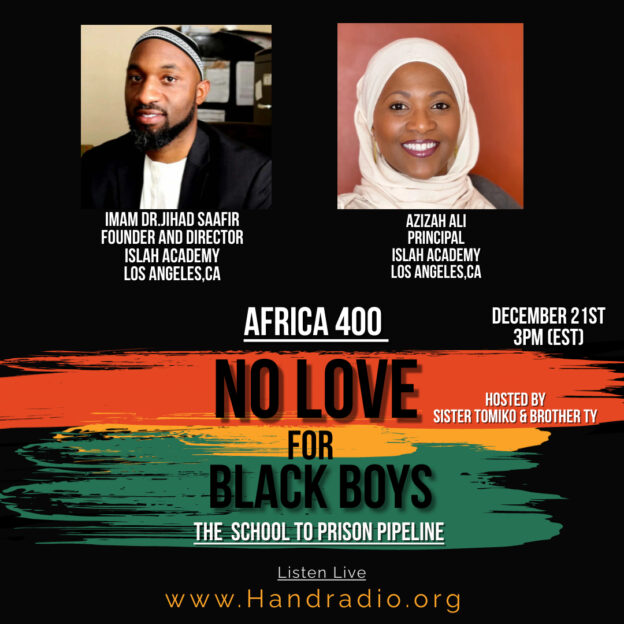
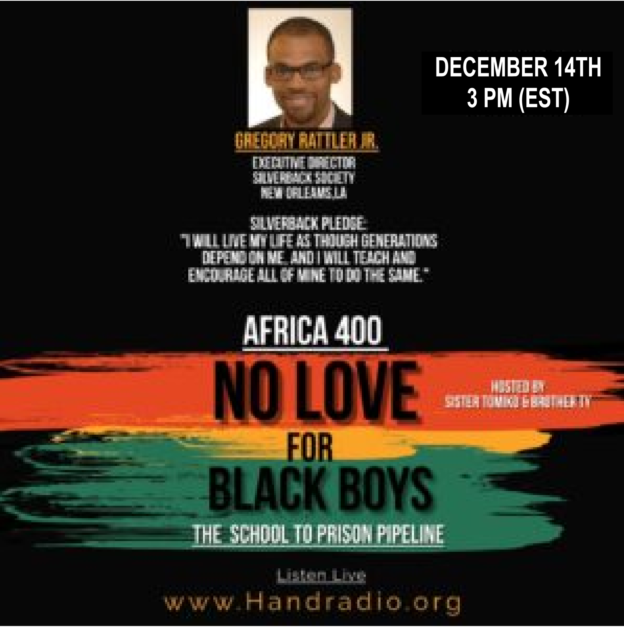
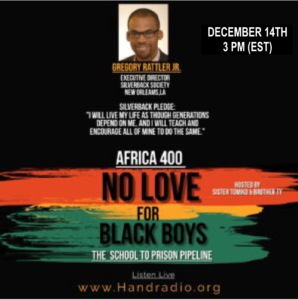
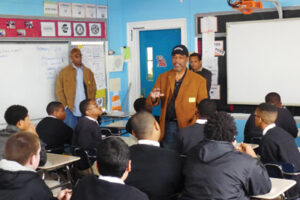 “Three years ago, I coaxed him into leaving City Hall where he directed the Cease Fire initiative,” says Dennis.
“Three years ago, I coaxed him into leaving City Hall where he directed the Cease Fire initiative,” says Dennis.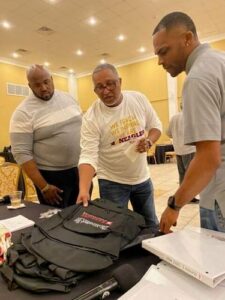 “Our young men know that every week there will be a mentor breathing life and positivity into their lives,” Rattler explains.
“Our young men know that every week there will be a mentor breathing life and positivity into their lives,” Rattler explains.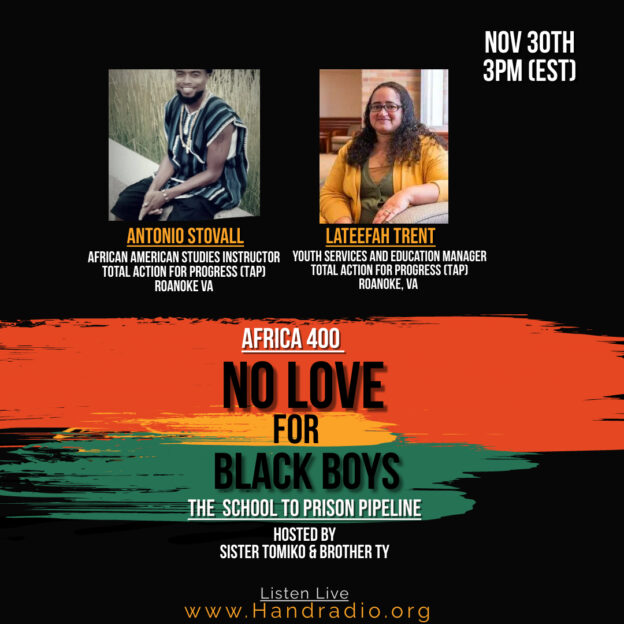
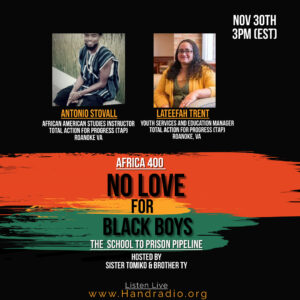 On the Wednesday, November 30 edition of Africa400, show hosts Sis. Tomiko and Bro. Ty welcome Instructor Antonio Stovall and Manager Lateefah Trent of Total Action for Progress (TAP), based in Roanoake, Virginia.
On the Wednesday, November 30 edition of Africa400, show hosts Sis. Tomiko and Bro. Ty welcome Instructor Antonio Stovall and Manager Lateefah Trent of Total Action for Progress (TAP), based in Roanoake, Virginia.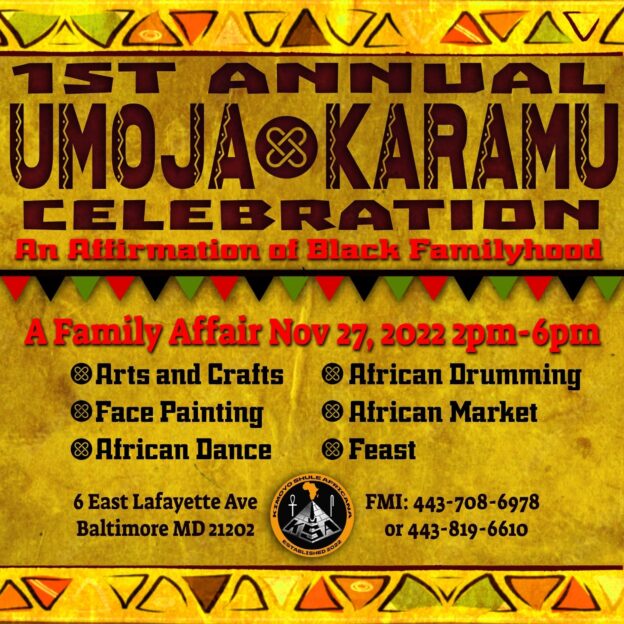
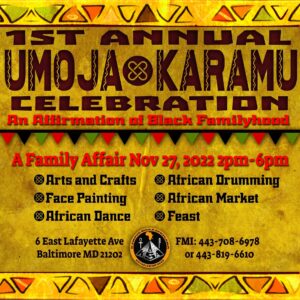
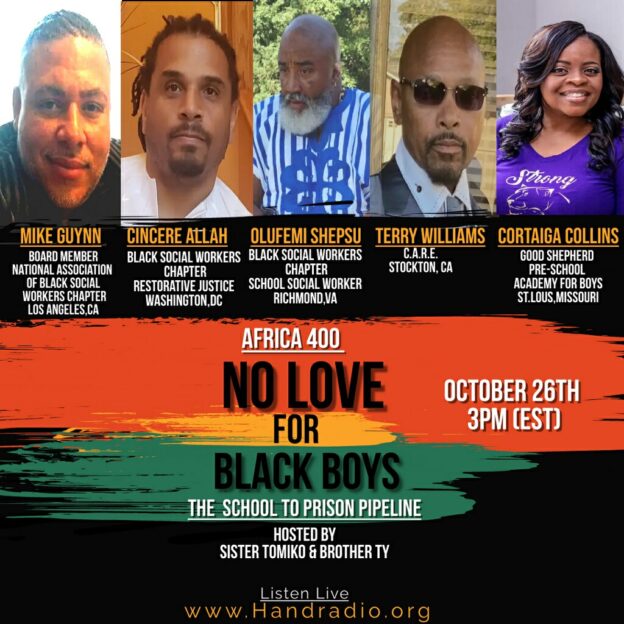
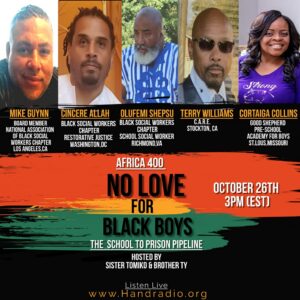 Africa400 returns to the airwaves on HANDRadio (
Africa400 returns to the airwaves on HANDRadio (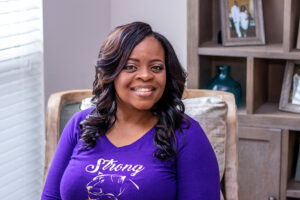 About Mama Cortaiga Collins
About Mama Cortaiga Collins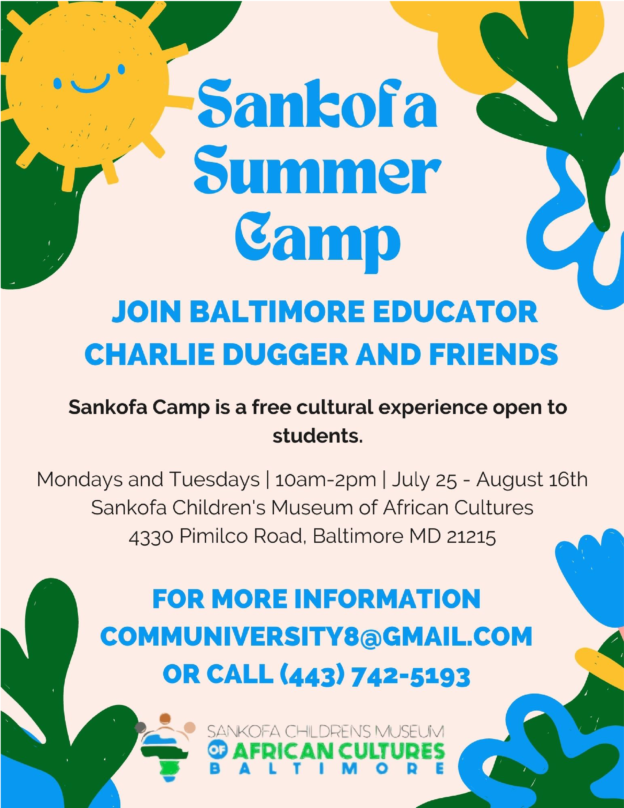
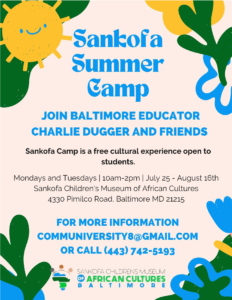 Baba Charlie Dugger has held cultural and educational events in the Baltimore, Maryland area for several decades through his organization Camp Harambee (The People), including the annual Marcus Garvey Day celebrations of the birthday of the Pan-Afrikan giant and founder of the Universal Negro Improvement Association and African Communities League (UNIA-ACL). Now Baba Charlie Dugger is sponsoring the Sankofa Summer Camp, a summer series of events taking place at the Sankofa Children’s Museum of African Cultures at 4330 Pimlico Road in Northwest Baltimore. The Camp will be held Mondays and Tuesdays from 10 am – 2 pm. For more information, call (443) 742-5193 or email
Baba Charlie Dugger has held cultural and educational events in the Baltimore, Maryland area for several decades through his organization Camp Harambee (The People), including the annual Marcus Garvey Day celebrations of the birthday of the Pan-Afrikan giant and founder of the Universal Negro Improvement Association and African Communities League (UNIA-ACL). Now Baba Charlie Dugger is sponsoring the Sankofa Summer Camp, a summer series of events taking place at the Sankofa Children’s Museum of African Cultures at 4330 Pimlico Road in Northwest Baltimore. The Camp will be held Mondays and Tuesdays from 10 am – 2 pm. For more information, call (443) 742-5193 or email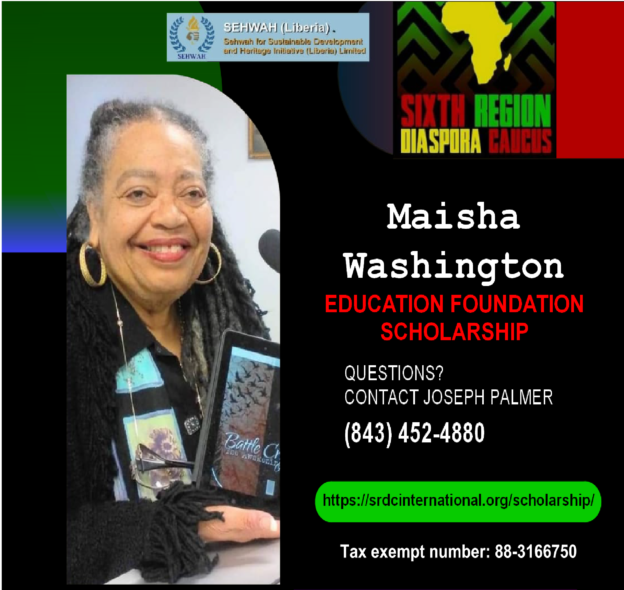
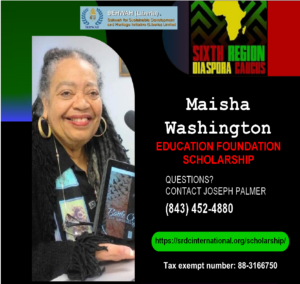 Sehwah-Liberia, Inc. and the Sixth Region Diaspora Caucus (SRDC) are announcing the
Sehwah-Liberia, Inc. and the Sixth Region Diaspora Caucus (SRDC) are announcing the 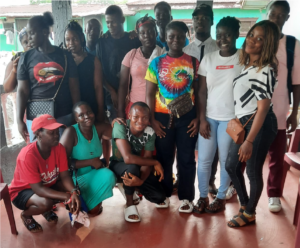
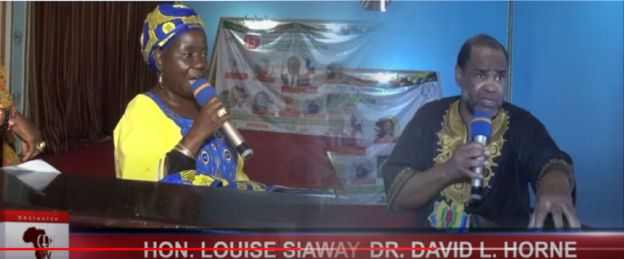
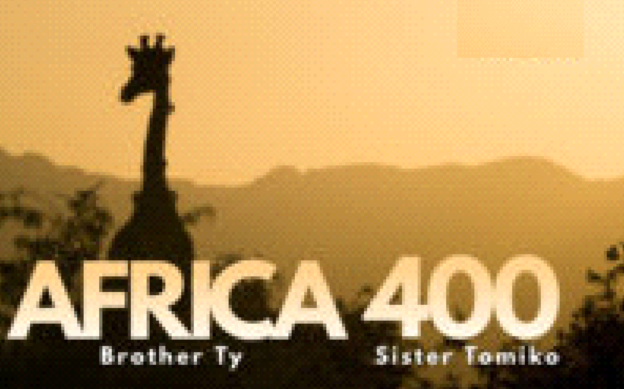
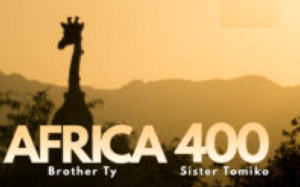 Africa400, the weekly Pan-Afrikan radio show hosted by Mama Tomiko and Baba Ty, with Special Episodes guest-hosted by Grandmother Walks On Water (“Mothership”) and Baba Francois Ndengwe (“Fresh News From Africa”), is taking a break from broadcasting as they make plans for the coming year.
Africa400, the weekly Pan-Afrikan radio show hosted by Mama Tomiko and Baba Ty, with Special Episodes guest-hosted by Grandmother Walks On Water (“Mothership”) and Baba Francois Ndengwe (“Fresh News From Africa”), is taking a break from broadcasting as they make plans for the coming year.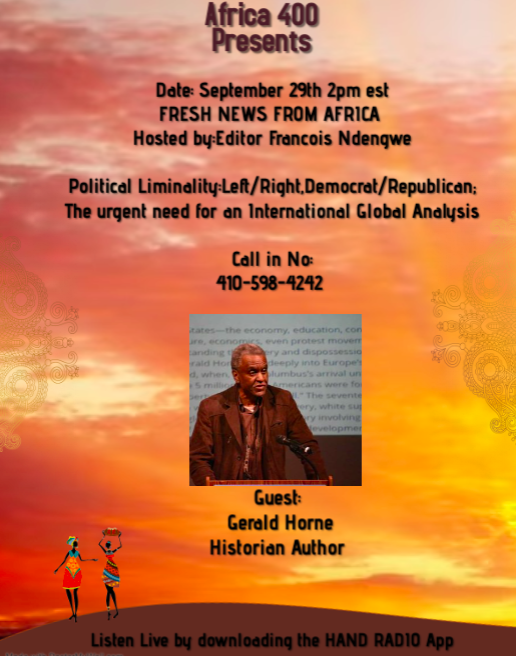
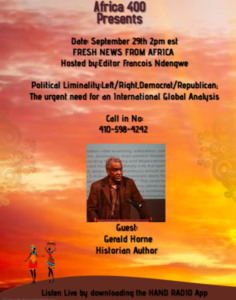 Dr. Gerald Horne, noted historian and author of several groundbreaking books on African and African-American history, will be the special guest of host Baba Francois Ndengwe on the “Fresh News From Africa” program, presented courtesy of Africa400 on HANDRadio. The show airs on Wednesday, September 29. He will discuss The Urgent Need for an International Global Analysis, particularly among African People and People of African Descent.
Dr. Gerald Horne, noted historian and author of several groundbreaking books on African and African-American history, will be the special guest of host Baba Francois Ndengwe on the “Fresh News From Africa” program, presented courtesy of Africa400 on HANDRadio. The show airs on Wednesday, September 29. He will discuss The Urgent Need for an International Global Analysis, particularly among African People and People of African Descent.